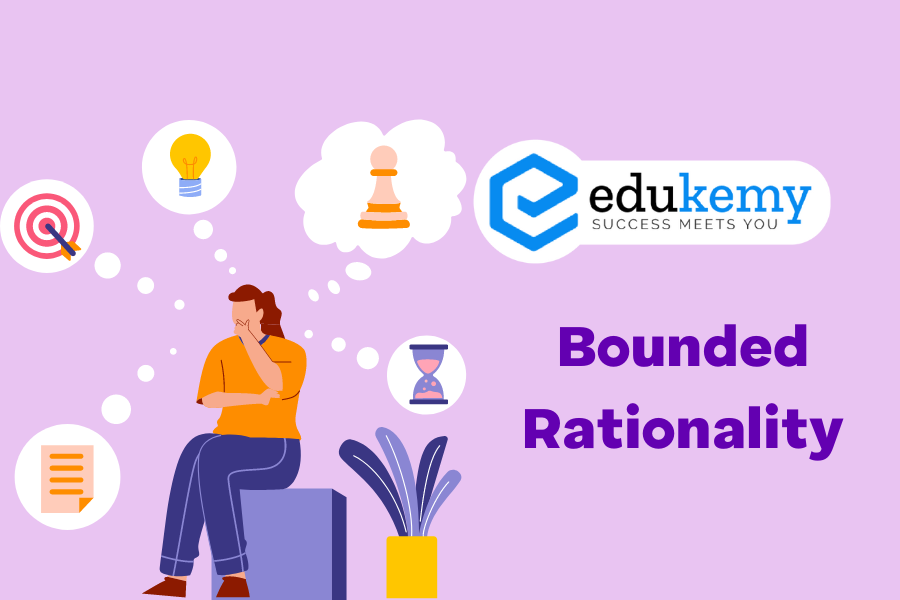
Bounded rationality, a concept pioneered by Nobel laureate Herbert Simon, challenges the traditional economic assumption of human beings as perfectly rational decision-makers. In contrast, bounded rationality suggests that individuals make decisions within the confines of their cognitive limitations, available information, and time constraints. This theory acknowledges that while humans strive to make rational choices, they often fall short due to inherent cognitive biases and the complexity of the real world. Consequently, bounded rationality has profound implications across various fields, from economics and psychology to organizational behavior and public policy, reshaping how we understand and approach decision-making processes. Through recognizing the bounded nature of human rationality, scholars and practitioners aim to develop more realistic models and strategies that accommodate our cognitive limitations and improve the quality of decision-making in both individual and collective contexts.
Contents
- 0.1 Concept of Bounded Rationality:
- 0.2 Vaccination Study and Bounded Rationality:
- 0.3 Innovation Adoption and Present Bias:
- 0.4 Policy Design Implications:
- 0.5 Policy Influence of RCTs:
- 1 FAQs
- 1.1 Q: What is bounded rationality?
- 1.2 Q: How does bounded rationality differ from traditional rational decision-making?
- 1.3 Q: What are some examples of bounded rationality in everyday life?
- 1.4 Q: How does bounded rationality impact organizational decision-making?
- 1.5 Q: Can bounded rationality be overcome?
- 2 In case you still have your doubts, contact us on 9811333901.
Concept of Bounded Rationality:
- Bounded rationality posits that, due to various factors, human rationality is limited in decision-making and behavior.
- In the context of economic and social studies, bounded rationality acknowledges that individuals may not always act in a fully rational manner, and their decisions can be influenced by cognitive limitations, biases, or external constraints.
Vaccination Study and Bounded Rationality:
- In the study on vaccinations, the findings revealed that offering incentives and improving the availability of healthcare positively impacted vaccine acceptance.
- The low vaccination rates were attributed, in part, to the recognition that individuals may not always make rational decisions. Some people exhibit reluctance to adopt modern technology, impacting their health-related choices.
Innovation Adoption and Present Bias:
- Duflo, Kremer, and others explored the adoption of innovations, like artificial fertilizer, among small landholders in sub-Saharan Africa.
- The concept of present bias was examined, wherein individuals may prioritize present concerns over future benefits, leading to delayed investment decisions. This behavior can create a cycle of postponing investments in the future, even when it’s in their long-term interest.
Policy Design Implications:
- Bounded rationality has significant implications for designing effective policies.
- If individuals exhibit present-biased behavior, temporary subsidies might be more effective than permanent ones. Offering incentives that are time-limited reduces the tendency to delay investment decisions, as observed in the experiment by Duflo, Kremer, and others regarding fertilizer use.
Policy Influence of RCTs:
- The examples of Randomized Controlled Trials (RCTs) conducted by Nobel laureates demonstrate the practical value of these findings for shaping public policies and interventions by NGOs.
- RCTs provide insights that consider the cognitive limitations and behavioral patterns of individuals, contributing to the design of more effective and targeted interventions.
FAQs
Q: What is bounded rationality?
Bounded rationality is a concept in behavioral economics that acknowledges the limitations of human cognition in decision-making. It suggests that individuals often make decisions that are rational within the constraints of their cognitive abilities, information, and time available, rather than fully optimizing every decision.
Q: How does bounded rationality differ from traditional rational decision-making?
Traditional rational decision-making assumes that individuals have unlimited cognitive abilities, perfect information, and ample time to make optimal choices. Bounded rationality, however, recognizes that these conditions rarely exist in reality, leading individuals to make satisficing rather than maximizing decisions.
Q: What are some examples of bounded rationality in everyday life?
Examples include choosing a restaurant based on convenience rather than exhaustive research, selecting a product based on brand familiarity rather than evaluating all available options, and relying on heuristics or mental shortcuts to make decisions quickly in complex situations.
Q: How does bounded rationality impact organizational decision-making?
In organizations, bounded rationality can lead to suboptimal decision-making processes. Managers may prioritize certain options due to cognitive biases, such as confirmation bias or anchoring, rather than thoroughly analyzing all possibilities. Additionally, time and resource constraints may limit the extent to which decision-makers can explore alternatives.
Q: Can bounded rationality be overcome?
While individuals cannot entirely eliminate the constraints of bounded rationality, awareness of these limitations can help improve decision-making. Techniques such as decision analysis, scenario planning, and structured decision-making processes can mitigate the effects of bounded rationality by encouraging systematic evaluation of options and consideration of multiple perspectives. Additionally, leveraging technology and data analytics can provide decision-makers with better information to support their choices.
In case you still have your doubts, contact us on 9811333901.
For UPSC Prelims Resources, Click here
For Daily Updates and Study Material:
Join our Telegram Channel – Edukemy for IAS
- 1. Learn through Videos – here
- 2. Be Exam Ready by Practicing Daily MCQs – here
- 3. Daily Newsletter – Get all your Current Affairs Covered – here
- 4. Mains Answer Writing Practice – here

